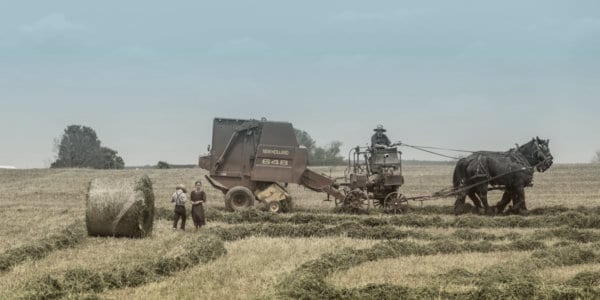Occasionally the principal, acting as the librarian, stood outside the staff room with an armful of books and invited students to borrow them. Apart from having a full-time teaching load, he was in charge of the cadet corps, overseeing the attic “rifle range” and Morse code instruction in winter, and cadet training each fall and spring. This repetitive daily activity was compulsory for all students.
Outside the building a peculiar puritanical code of conduct dictated that male and female students abide by a rule that separated the sexes with a sidewalk that extended the full length of the school grounds. It was not to be crossed. The crotchety spinster math teacher made it her duty to surreptitiously patrol the lawn under the trees to ensure that there were no infractions. Those apprehended were hauled before the principal. He never made much of an issue out of these teenage indiscretions.
In total the enrollment never exceeded more than 225 students. It employed a staff of about 8 teachers. My grade 9 class began with 45 students and ended in grade 13 with 5 graduates. It closed in 1954, the year I graduated, and the students along with hundreds of others from a wider jurisdiction were transferred to a modern new school in the same village.
My generation did not realize, until much later, that the remarkable changes were largely due to the post-war boom. After beginning my teaching career at 19 in 1955, and spending the next 34 years in education, it seemed that I had become used to taking the rapid societal changes in stride. Those that occurred early in my life seemed to affect me much more directly. Later, so much was happening that we adopted a “ho-hum” attitude to global changes such as high-tech communication satellites circling the earth to instantly connect us to world events, news, and entertainment 24 hours a day.
Throughout our lives we are generally aware of the big events that change our world, and that require us to adapt, but we tend to pay close attention to those that impact us directly, close to home, whether personally or professionally. Living through 80 years of rapid, tumultuous change is no small feat. We had to learn how to cope, and adapt in order to survive. In many instances we welcomed the changes. But if I were asked to name the one change that had the biggest impact on my life I would answer without hesitation: the introduction high school bussing in my community. It opened up a wonderful future for me that subsequently resulted in a rewarding and highly satisfying life journey.
If interviewed on my 80th birthday, however, the TV journalist would very likely skip the part about a life-altering change, and cajole me into revealing a juicy sound bite about the secret of my longevity. Of course I would have a ready answer. Without doubt, my reaching the Big 8-0 is entirely due to my lifelong habit of eating one pungent raw onion before bedtime each night, and consuming a half-liter of thick buttermilk each morning before breakfast. And that’s no bunk!





